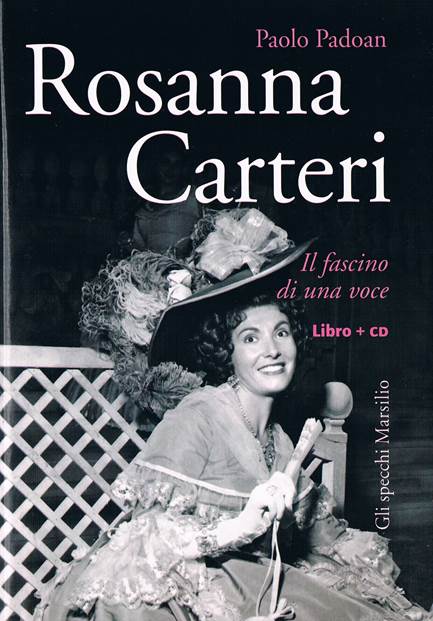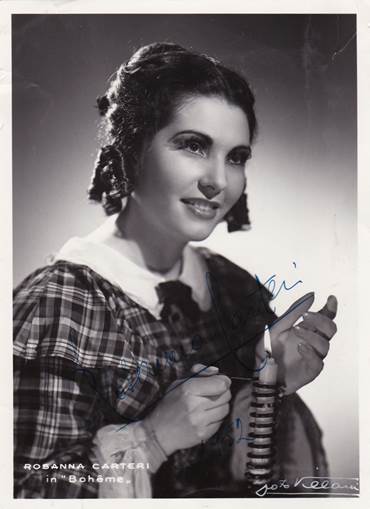
ROSANNA CARTERI ; Il fascino di una voce by Paolo Padoan

By Paolo Pedani ; Marsilio Editore ; 304 pages (CD included).
Rosanna Carteri is one of the few surviving singers from the New Golden Age of Singing. Her partners included tenors as Aureliano Pertile and Luciano Pavarotti. She gave her first concert at the ripe age of 14 singing for German soldiers. She left the stage (only 35 years of age) at the end of 1965, returned for three performances 13 months later and once again disappeared for five years when after some problematic moments she definitely took her leave of the operatic scene. Any biographer knows the problems of writing the story of a living person. Not everybody (and surely not an Italian opera singer born before the war when keeping up appearances was so important) agrees in exchange for information to a portrait with some warts included. This is not to say that madame Carteri had something to hide; but it doesn’t make for a full biography. As no male companion is mentioned before her marriage at the age of 29 one has to believe that the lady was vergine intatto after a career of ten years in the hothouses that are Italian theatres. One has to believe that after a miscarriage the soprano didn’t’ want to take a risk, gave birth to a second child and cancelled all contracts (and paid the amends) for later performances. This is all well possible, even highly probable, but one doesn’t get the impression the author checked these facts with other sources than the soprano’s interview with a journalist a quarter of a century ago. And has she been living half her life with her husband (industrialist) in Monaco ? Only for tax evasion or for better reasons ?

(as Mimi, courtesy Charles Mintzer)
Even though Carteri might have been not very forthcoming, Padoan could have commented on her strange career. But the author clearly belongs to the school of “and then she sang here with tremendous success and then she went there and got a triumph etc.” The best part of the book therefore is the fine chronology by Roscioni and Valesio and the complete discography (pirates included) by Maurizio Tiberi. But it is when studying these lists that some questions pop up not answered by Mr. Padoan. After some early successes with her young fresh voice and good looks Carteri made her debut at La Scala at 21 with a forgotten opera by Piccinni. Nothing exceptional there as most young and promising singers have to serve in the galleys before they become stars. But Carteri’s career seems to be an on-and off story. While she got better known, made some fine recordings and had clearly become a household name in operatic circles, she still sang roles as Elsa in Gazzaniga’s Il convitato di pietro (1956) or Porzia in Castelnuovo Tedesco’s Il Mercante di Venezia (1961) (which she clearly calls a waste of time and money) or Rossellini’s. Il linguaggio dei fiori (1963; at the Piccolo Scala). Was she short of work ? a fine score reader ? a darling of modern composers ? These are questions not answered by the author. Though she never descended into the deep province, performances in her last great year with Limbania Leoni, Vito Tatone in Cesena, Cremona, Rimini,Viareggio etc. do not point in the direction of a world career but more in the way of a good house soprano on the way down. Maybe her wish to be as close as possible to her daughter explains somewhat this parabola but for one in full possession of her powers and preferring to be in Italy one would expect her to be at La Scala, in Rome, Naples or Venice. Mr. Padoan anyway doesn’t take pains to look too deep into this question. A few times he mentions the cutthroat tactics of Italian operatic life but with the exception of an easy target as Callas (who feigns not to recognize Carteri after the latter’s successes) we get no other examples of how things worked or didn’t work out for a singer in the fifties. On her vocal powers too he is not very strong. Almost all of the time he makes things easy for himself by judiciously quoting almost always superlative reviews by others and he has clearly some difficulties when sterner critics as Rodolfo Celetti are not always impressed by Carteri’s efforts; especially as Violetta. Even Padoan has to admit that a few Rigoletto’s at La Scala (Warren, Di Stefano) were a mistake as the soprano simply did not have the necessary technical means to assume the role. Carteri had a sound good lyric soprano; somewhat dark in colour and was clearly still a child of her time. As a Veronese she had assisted from an early age at the performances in the arena when verismo was still at its height and singers like Caniglia and Gigli influenced her. Therefore sobs and an ah and an oh are always part of her singing and she often chops up phrases for effect. Nevertheless though no Tebaldi or Freni hers is still an agreeable and convincing sound in the Italian tradition which in our years of generic and boring singing we miss dearly.
Jan Neckers
Click here for our review of Mme Carteri's Rondine DVD